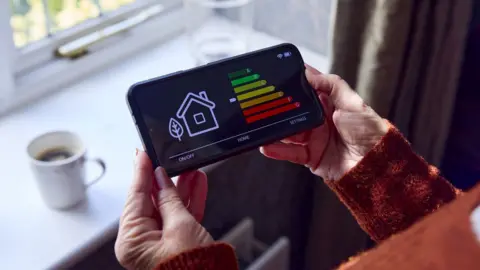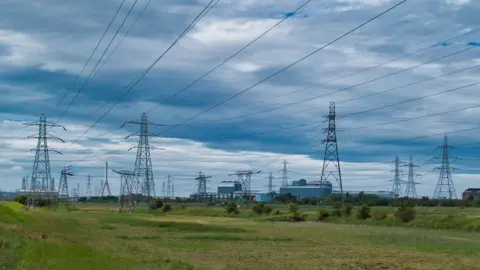Energy Q&A: How much will heating cost and what help is available?
 Getty Images
Getty ImagesWith colder weather on the way, millions of households in Wales face another spike in energy costs.
The yearly bill for a typical household has fallen for the period between 1 October and 31 December compared to last year, but bills are forecast to rise again in January.
Some government support that was available for people last year has also now been withdrawn.
We take a closer look at why prices are still high and what help is available this winter from both the Welsh and UK government.
ENERGY BILL CAPS
Under the current price cap, a typical annual dual-fuel direct debit energy bill will be £1,923 a year. The cap applies to the unit rate of energy, meaning households who use more than a typical amount will still pay more than £1,923 a year.
The cap is reviewed every three months and is £577 lower than last winter.
But last year, each household received £400 of support over six months from the UK government. No equivalent scheme has so far been announced this year.
Some of the schemes provided by the Welsh government last year will also not be repeated this year.
This includes a £200 payment made to low-income households by local authorities, and a £150 cost of living payment.
 Getty Images
Getty ImagesThe Welsh government said: "We continue to do all we can to provide targeted support to those in greatest need. During this financial year and the last, this is worth more than £3.3bn."
For prepayment meter customers, some 200,000 households in Wales, the price cap has been set at £1,949 a year.
Have standing charges gone up?
Standing charges, which make up energy bills along with the units used and 5% of VAT, are also at record highs.
The charges, set by UK energy regulator Ofgem, cover the cost of transporting gas and electricity to where you live.
The average standing charge is £350 a year, but costs vary regionally however and go up to £380 a year in north Wales - the highest in the UK - compared to £298 a year in London.
Fuel poverty in Wales
National Energy Action (NEA) Cymru estimates that 45% of Wales' households and virtually all of the country's lower-income households live in fuel poverty, spending more than 10% of their full household income to keep their home warm.
"We're very, very concerned about the winter ahead," said Ben Saltmarsh, director of NEA Cymru.
"Low-income households are going to face a very tough winter again. For many, worse than the winter before," he added.
"Many households are also going into this winter in greater debt than before. This severely impacts on people's ability to afford the energy they need to stay warm and forces them to cut back even further."

Welsh government energy bill support
The Discretionary Assistance Fund provides grants for those in extreme hardship to help pay for gas, and electricity. Applicants can be awarded a maximum of three payments in a year, ranging from £56 for a single-person household to £111 for households of three or more people.
For those on pre-paid meters, the fuel bank foundation, which the Welsh government helped fund, provides grants to support low-income households at risk of being disconnected.
Vouchers worth £49 are available in winter, with pre-payment meter households receiving up to three vouchers over a six-month period. The scheme also helps customers off the gas grid and who rely on alternative fuel such as heating oil.
The Warm Homes programme funds energy efficiency improvements via the Welsh government's Nest scheme.
UK government energy bill support
The Warm Home Discount scheme offers low-income households and those vulnerable to cold-related illness one-off energy bill rebates of £150.
Older people will receive a winter fuel payment of between £250 and £600 to help pay for heating bills. Most people get the payment automatically if they are eligible, and will receive a letter in October or November saying how much they will get. Most people are paid in November or December.
A Cold Weather Payment helps people on certain benefits if temperature drops to or below zero for seven consecutive days. Those eligible will get £25 for each seven-day period of very cold weather between 1 November and 31 March.

